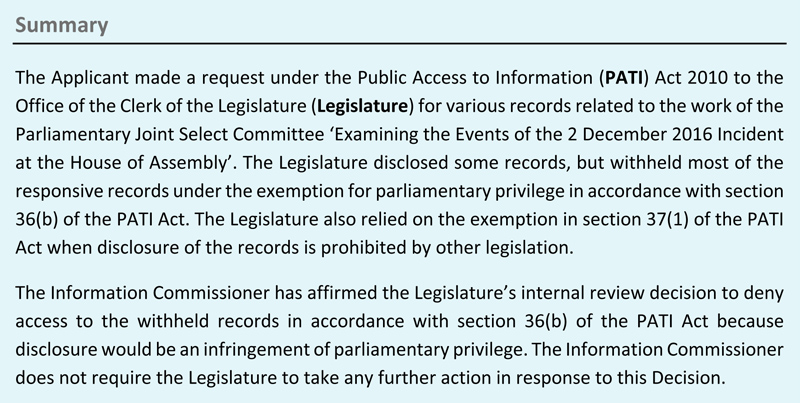ICO Decision: PATI Request To Legislature Office
Information Commissioner Gitanjali Gutierrez issued a decision which addressed the parliamentary privilege exemption for the first time, with the decision considering an internal review in response to a PATI request asking for records relating to the work of the Parliamentary Joint Select Committee on the December 2nd, 2016 incident at the House of Assembly.
A spokesperson said, “On 21 December 2020, Information Commissioner Gitanjali Gutierrez issued Decision 17/2020, Office of the Clerk of the Legislature. In this Decision, the Information Commissioner addressed the parliamentary privilege exemption for the first time.
“Decision 17/2020 considered an internal review decision issued by the Office of the Clerk of the Legislature (Legislature) in response to a PATI request asking for records relating to the work of the Parliamentary Joint Select Committee ‘Examining the Events of the 2 December 2016 Incident at the House of Assembly’.
“The Legislature disclosed some records to the Applicant, but denied access to most of the responsive records under section 36(b) of the PATI Act, which allows public authorities to withhold public records if disclosure would be an infringement of parliamentary privilege.
“In this Decision, the Information Commissioner explained that a key aspect of the constitutional doctrine of parliamentary privilege is each House’s ‘exclusive cognisance’ of its own affairs.
“This means that each House has the right to manage its own affairs and to exercise sole jurisdiction over its own proceedings. The parliamentary privilege exemption in the PATI Act protects this exclusive cognisance by recognising that each House of Parliament has the right to control publication of its own proceedings.
“Although the Information Commissioner found in Decision 17/2020 that the Legislature was correct to deny access to the responsive records under the parliamentary privilege exemption for the specific PATI request at issue, she emphasised that not every record relating to Parliament will fall within the parliamentary privilege exemption.
“Bermuda’s Parliament has included the Legislature as one of the public authorities in the Schedule to the PATI Act. The exemption in section 36(b) does not apply to records held by the Legislature if disclosure would not be an infringement to parliamentary privilege.
“Finally, the Information Commissioner emphasised that under the doctrine of parliamentary privilege, Parliament is accountable to its collective conscience, and ultimately, to the public who elect its members.”
The full version of Decision 17/2020 follows below [PDF here]:


